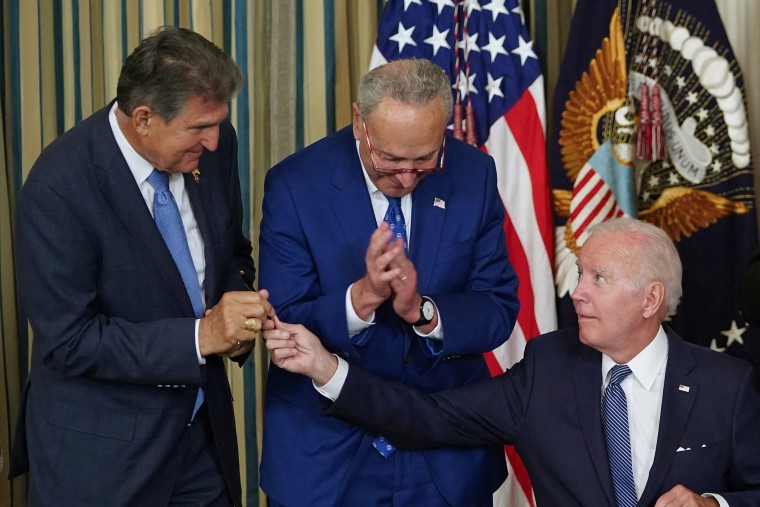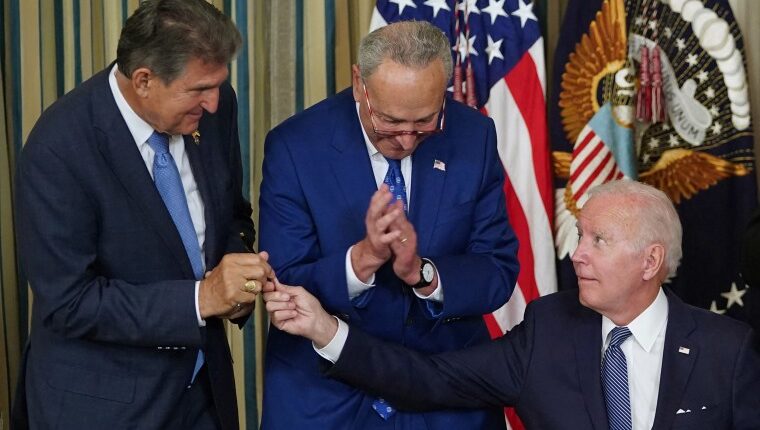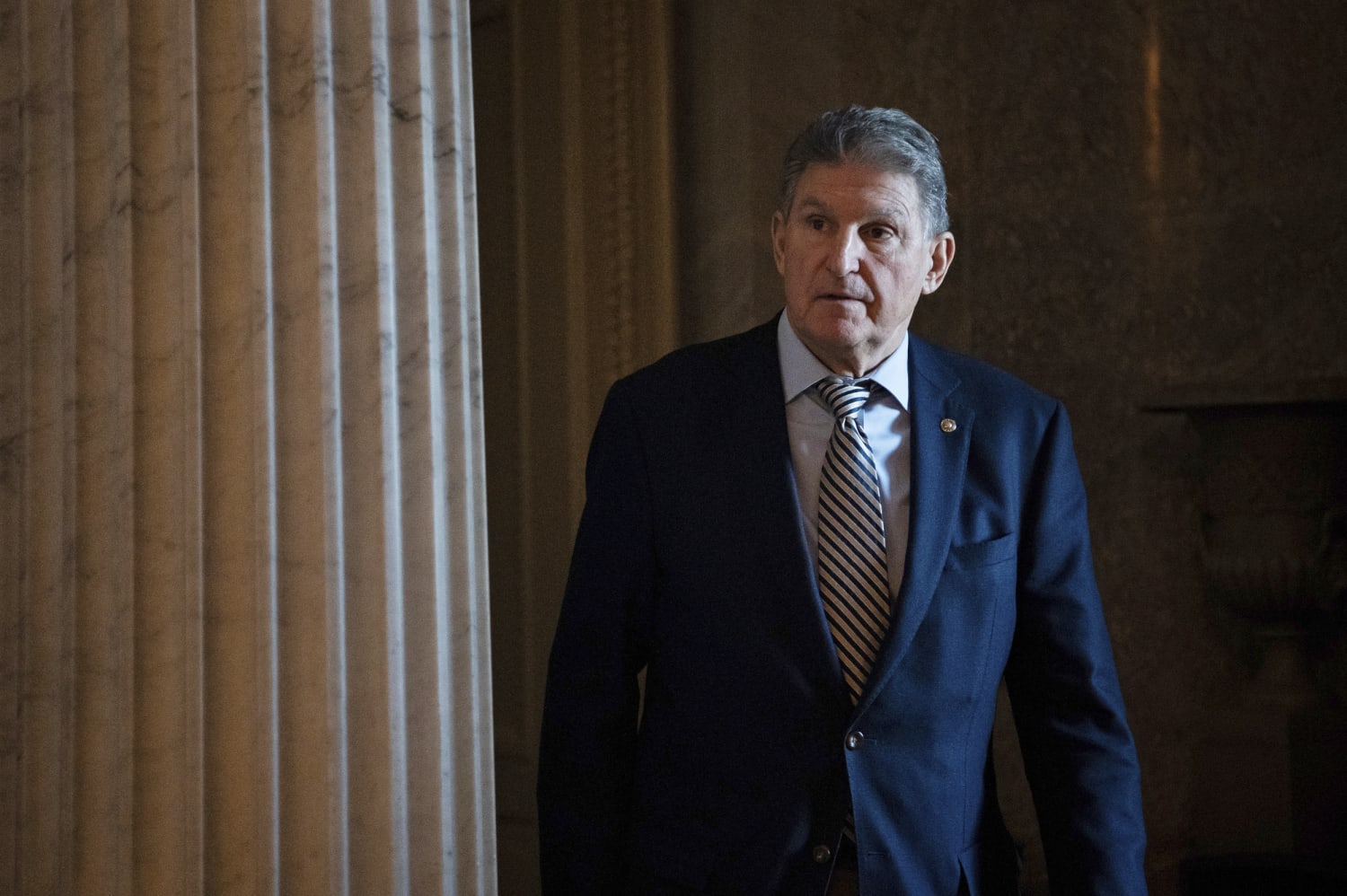When President Joe Biden marks the first anniversary of the Inflation Reduction Act next week with a major celebration at the White House, one prominent invited guest is not expected to be in the crowd.
The decision by Sen. Joe Manchin of West Virginia to skip the White House’s campaign-style affair highlighting the climate and health spending law he helped write — and name — is just the latest sign of an increasingly fraught relationship between Manchin, a conservative Democrat, and the Biden administration.
Manchin is openly flirting with a third-party run for the presidency in 2024, a move that could upend Biden’s prospects of winning re-election. Even if Manchin doesn’t take that controversial step, he is already trying to demonstrate greater independence from the White House ahead of another possible Senate run in his deeply Republican state. And Thursday, he said he is “absolutely” considering changing his party affiliation from Democrat to independent.
“I’ve been thinking about that for quite some time,” he told a West Virginia radio host.
How Manchin might create headaches for the president was a topic of discussion during a previously unreported dinner earlier this month between the senator and one of Biden’s top aides, Steve Ricchetti. The two men dined after the Senate adjourned for its August break and discussed what the White House might expect from Manchin in the coming months once the Senate is back in session, two sources with knowledge of the relationship between them told NBC News.
Ricchetti remains the main conduit to Manchin as the West Wing nervously eyes the senator’s every move. The goal of their dinner was similar to that of their other, fairly regular, discussions: to try to ensure the president is not caught off guard when Manchin publicly breaks with him, the sources added. They did not say if Manchin’s consideration of a third-party presidential run or becoming an independent was discussed.
A senior White House official downplayed the significance of Manchin’s absence at next week’s Inflation Reduction Act event, noting it was taking place during a congressional recess. But his absence is a stark contrast to the White House bill signing ceremony last year, which also took place during a congressional recess. Manchin was featured prominently at that event, and in a gesture acknowledging how central he was to the legislation’s passage, Biden gave him the pen he used to put his signature on it.
“We will keep finding ways to work together,” the senior White House official said of Manchin. The official said the president’s team still has a close working relationship with Manchin and noted the senator “helped us find a way to thread the needle and get things done.”
Still, Manchin underscored the tension between his political ambitions and the president’s in a statement about the Inflation Reduction Act’s anniversary. He praised the law as “one of the most historic pieces of legislation passed in decades” and said it’s having an impact in his state. But he also vowed to “continue to fight the Biden administration’s unrelenting efforts to manipulate the law to push their radical climate agenda at the expense of both our energy and fiscal security.”

Biden on Tuesday kicked off a two-week, administrationwide effort to promote the Inflation Reduction Act with an event in Arizona that featured another senator with an independent streak who has at times complicated White House legislative efforts: Kyrsten Sinema. The former Democrat, who changed her party affiliation to independent in December, spoke ahead of Biden as he designated a new national monument near the Grand Canyon. Biden and Sinema later appeared to have a friendly conversation as he was waiting to be introduced for his remarks.
Sinema, like Manchin, won’t attend the White House commemoration next week because of “scheduling conflicts,” an aide said, despite having voted for the legislation. Sinema, who continues to organize with Democrats in the Senate, similarly has not said if she’ll seek a second term next year.
But it’s Manchin’s seat that Republicans are really eyeing as a top pick-up opportunity next year in a bid to flip the Senate from blue to red.
Manchin is the only remaining Democrat elected statewide in a state that then-President Donald Trump won in 2020. Trump won West Virginia by almost 40 percentage points over Biden.
Senate GOP Leader Mitch McConnell, who previously praised Manchin for being a thorn in the side of Democrats, has since turned on him. McConnell’s super PAC, the Senate Leadership Fund, has rallied behind Manchin’s would-be opponent, West Virginia Gov. Jim Justice, a former Democrat who turned Republican.
“It wasn’t smart to do what I did if I’m doing strictly about politics,” Manchin admitted Thursday regarding his eleventh-hour deal last year to push Democrats’ signature legislative priority over the finish line. He blamed Biden for “catering to one side” in billing the Inflation Reduction Act as all “green and clean,” rather than emphasizing the bill’s investments in energy security.
As Manchin’s political dynamics at home have grown more precarious, he’s tried to further distance himself from Biden. That has made his relationship with Ricchetti all the more critical for the White House amid the president’s 2024 campaign. But it’s also generated some more public clashes.
Perhaps most notably, Manchin has repeatedly torched how the Biden administration has implemented certain aspects of the Inflation Reduction Act, including several climate-related initiatives. He’s vowed to block Biden nominees for Environmental Protection Agency posts. He’s even threatened to support Republicans’ push to repeal the legislation if the Biden administration doesn’t prioritize its fossil fuel investments.
Another White House official said in a statement that “we are implementing the Inflation Reduction Act as written, which is achieving many goals we share with Senator Manchin.”
The shift started just months after, in the summer of 2022, Ricchetti helped navigate the legislative ups and downs of the bill with Manchin. In the end, it was Manchin who revived Biden’s dormant Build Back Better agenda by striking a quiet deal with Senate Majority Leader Chuck Schumer to pass a watered-down measure he could support. He so embraced the bill that he took credit for the new moniker.
“The name that I came up with was the Inflation Reduction Act,” Manchin told reporters at the time.
During Thursday’s radio interview, Manchin once again defended the law’s title.
“I knew it would not enhance inflation; it would reduce inflation. … The effect of the bill [on inflation], you can’t disagree with that,” Manchin said in an attempt to counter the host’s criticism.
Later in the day, Biden appeared to burst Manchin’s bubble.
“I wish I hadn’t called it that,” he said at a fundraiser in Utah, “because it has less to do with reducing inflation than it has to do with providing alternatives that generate economic growth.”
Source: | This article originally belongs to Nbcnews.com









